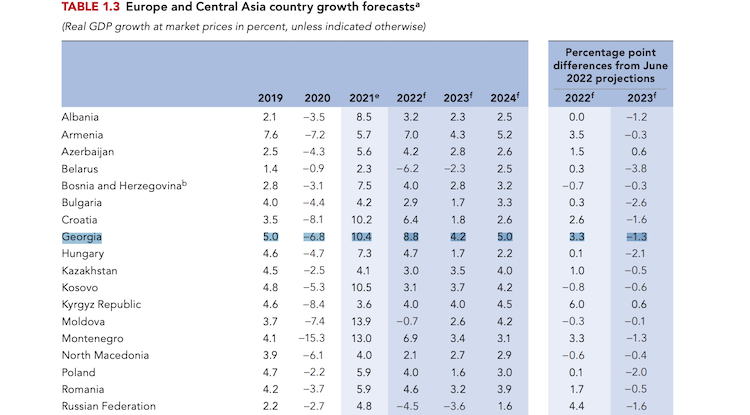World Bank raises 2022 economic growth forecast for Georgia from 5.5% to 8.8%

The update comes in the institution’s update for the region, released today, however the report also projects growth in Georgia to slow down in 2023 to an estimated 4.2 percent. Photo: Nino Alavidze/Agenda.ge
Following the double-digit growth of the Georgian economy in the first eight months of the year, the World Bank has raised its 2022 economic growth forecast for the country from the previously projected 5.5 percent to 8.8, the highest in the Europe and Central Asia region.
The update comes in the institution’s update for the region, released today, however the report also projects growth in Georgia to slow down in 2023 to an estimated 4.2 percent.
The deceleration reflects weakening momentum after a strong rebound in 2022, the slowdown in the European Union, and a sharper-than-expected contraction of 2023 output in Russia", the bank has said.
Sebastian Molineus, the World Bank regional director for the South Caucasus, said the Georgian government should remain "fiscally prudent" and use "any additional revenues to pay off some of its fiscal burden and to act in a fiscally prudent manner".
 Image: World Bank
Image: World Bank
"When it comes to Georgia itself, we see a growth rate of 8.8 percent, which right now is the highest in the entire Europe and Central Asia region, largely based on an increase in domestic demand, increase in net money transfers, as well as a strong tourism receipts and remittances as well”, he noted.
“With this said, we believe that both the government and the National Bank of Georgia need to remain vigilant. Certainly, there needs to be a tightening of monetary policy, should the inflation still tick upwards", he said.
The European Bank for Reconstruction and Development also raised its economic growth forecast for Georgia recently, announcing it was expecting the country’s economy to grow eight percent this year, "significantly higher” than the previously predicted three percent growth.
The Asian Development Bank projects the Georgian economy to grow seven percent in 2022, "driven by higher export and tourism revenue, a large inflow of money transfers, and strong private consumption".
The Georgian economy grew by 10.5 percent in August and by 10.3 percent in the first eight months of 2022 year-on-year, the latest data from the national statistics office showed. Prime minister Irakli Garibashvili credited the "unprecedented" double-digit economic growth to his government's "reasonable policy”.
 Tweet
Tweet  Share
Share